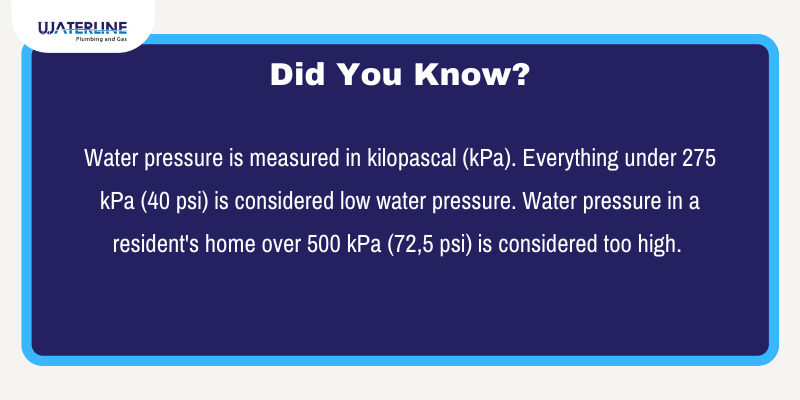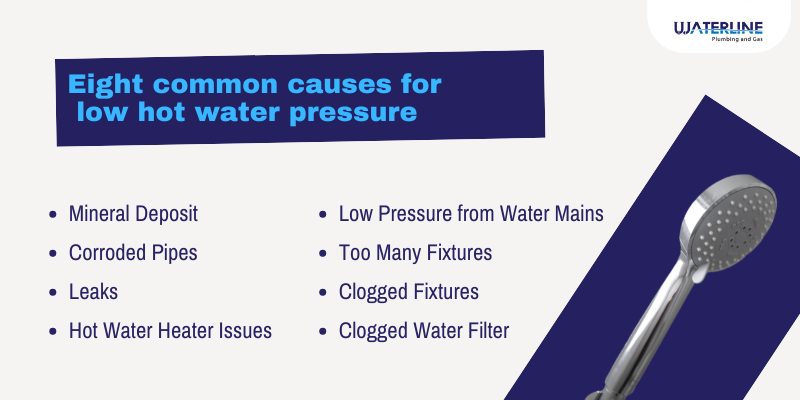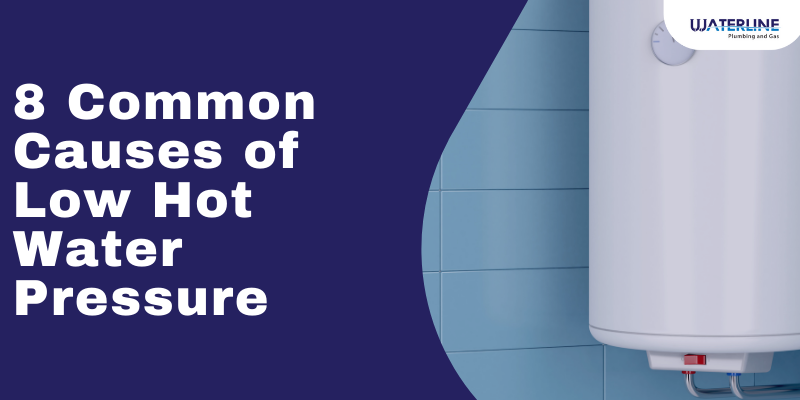After a long day, there is nothing more satisfying than a hot shower. As such, turning on the shower only to have the water stay freezing cold or to have low water pressure can be extremely frustrating. If this is something that you experience on the regular, it’s time to consider whether you’re dealing with low hot water pressure, or an issue with your hot water production, and whether or not to get a plumber in to fix the issue.
Low hot water pressure is very common, can be caused by a wide variety of issues, and can easily be remediated with a qualified local plumber. Within this article, Waterline Plumbing have outlined the eight most common causes of low water pressure, what you can do yourself with poor water pressure, and when to contact a plumber.
The basics of water pressure
Water pressure refers to how quickly the water reaches your plumbing and plumbing outlets, like your shower head.
Water pressure is measured in kilopascal (kPa). Water pressure in a resident’s home should never exceed 500 kPa (72,5 psi). Everything under 275 kPa (40 psi) is considered low water pressure. Using a pressure gauge can help to determine if you’re dealing with low hot water pressure, or something more sinister with your hot water system. If the hot water pressure is palpably low but cold is fine, the chances are that there is a problem in your water supply system.

What can cause low hot water pressure?
If you’re dealing with no or poor hot water pressure within your home, there are a couple of different reasons as to why this may be occurring.
Here are eight of the most common causes of poor hot water pressure.
- Mineral Deposit – Hard water can cause mineral deposits in a hot water system. The increasing build-up of mineral deposits can result in blockages in pipes, slowly and steadily reducing hot water pressure. Limescale, a chalky white substance of calcium carbonate, is the most common mineral deposit in water supply systems. If your area is known for hard water and the hot water pressure is low, check the equipment and pipes for any mineral deposit.
- Corroded Pipes – Corroded pipes can also cause low hot water pressure. When a home has old, galvanised steel pipes, mineral deposits can build up over time, as pipes naturally corrode over time. Therefore, the amount of hot water passing through is reduced. The long term solution for this issue is to exchange the pipes for a better, more corrosion-resistant material, such as copper or PEX.
- Leaks – One of the main causes of low water pressure is leaking pipes. When a leak occurs in water pipes, this can cause water pressure to drop altogether. In this case, an inspection of your water pipes is necessary to find the leak ASAP and prevent moisture damage to the property.
- Hot Water Heater Issues – The water heater is essential to a hot water system. If this equipment is not working correctly, it can cause poor hot water pressure. Check for any signs of leaks and ensure that the thermostat settings are correct. Chances are, it could be time to replace your hot water system.
- Low Pressure from Water Mains – The main water supply is the part of a water system that supplies water to your water heater. If not functioning correctly, a water heater will not be able to produce enough hot water for your household, resulting in low pressure.
- Too Many Fixtures – The more fixtures connected to the hot water system, the lower the water pressure will be for each fixture. This can lead to inadequate pressure when all are being used simultaneously.
- Clogged Fixtures – The fixtures can also cause low hot water pressure in a home when clogged. If a faucet or showerhead is blocked, the hot water pressure will be limited as water passes through.
- Clogged Water Filter – Some hot water systems use filters on the inlet and outlet. Over time, these filters can become clogged by the debris they are protecting the system against, causing low hot water pressure.

How to Fix Poor Hot Water Pressure
There are a few things that residents can do if they suspect poor hot water pressure. If you believe there is an issue with your hot water pressure, you can check water filters and fixtures for clogging. It’s also worth looking for leaks in visible piping, the hot water system, and the main water supply, if you know what you’re looking for.
However, if you suspect an issue with your hot water pressure, you need to call in an expert plumber to test, assess, and remedy your concerns.
Final Thoughts
Low hot water pressure can be caused by a wide range of issues. If you suspect that your hot water pressure is not performing properly, it’s important to get an expert plumber out to your property as soon as possible.
Waterline Plumbing is Perth’s leading provider of residential and commercial plumbing services. If you’re looking for a plumber in Perth’s Northern Suburbs that you can trust, Waterline Plumbing is who you’re looking for. Get in touch with our expert team by calling 0450 334 373 or by submitting an online enquiry today.

